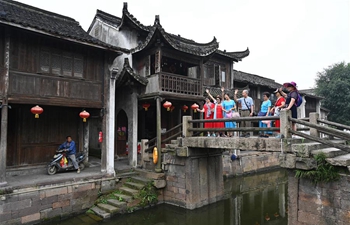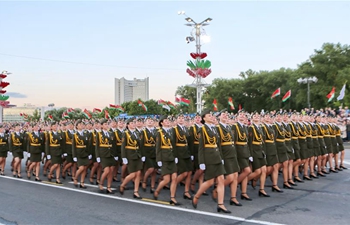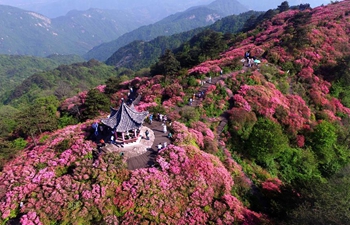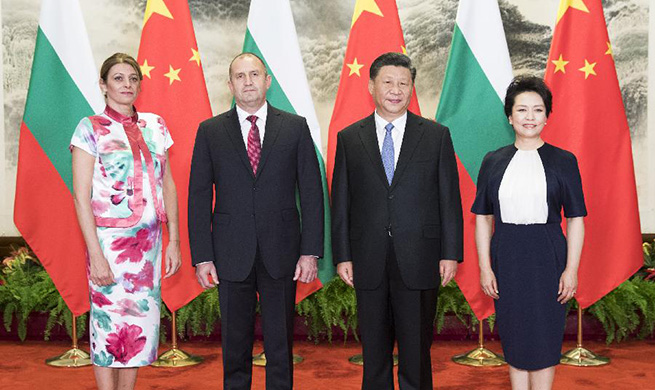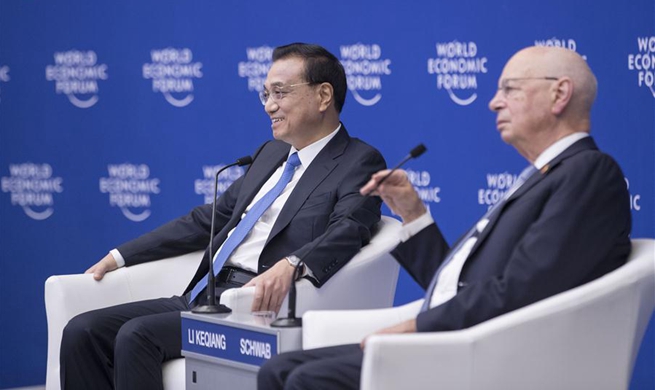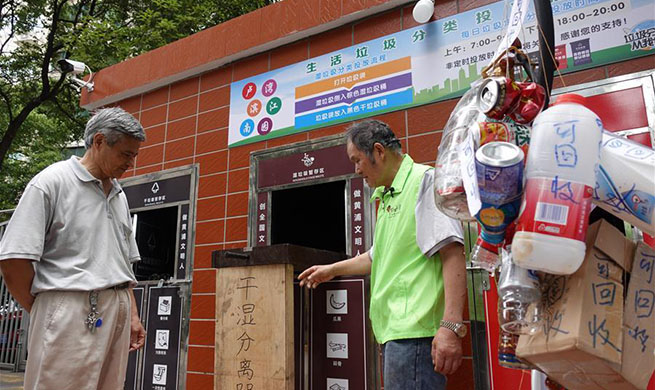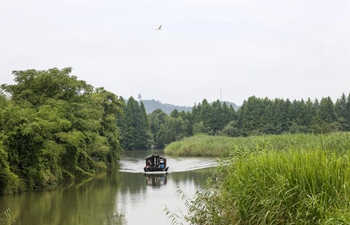TOKYO, July 4 (Xinhua) -- Official campaigning kicked off Thursday for Japan's upper house election on July 21, with the vote likely to be a public mandate on the overall performance of the administration of Prime Minister Shinzo Abe, against a backdrop of a number of politically and publicly weighty issues.
The 17-day campaign period will almost certainly result, in part, in a public mandate on Japan's sputtering economy, with the public concerned that a planned consumption tax hike from 8 percent to 10 percent slated for October this year, might plunge the nation into recession, as was the case when tax here was raised from 5 percent to 8 percent.
In the months after the consumption tax was raised to 8 percent from 5 percent in April 2014, Japan's economy took a hard hit, with gross domestic product shrinking an annualized 1.6 percent in the three months through September, the Cabinet Office said at that time.
Unadjusted for price changes, the economy contracted an annualized 3 percent in the period, the Cabinet Office said.
In contrast to the ruling Liberal Democratic Party (LDP) and its Komeito ally, who advocate the need to raise the consumption tax but have delayed raising it twice amid economic uncertainty, all five opposition parties are opposed to the controversial tax hike, believing more focus should be given to supporting domestic households.
The planned tax hike, the wake of which will again see both public and private consumption diminish as businesses and households tighten their purse strings, according to leading economists here, comes at a time when Japan's economy, amid a lack of growth drivers and increasingly negative impact from an aging and shrinking society, has also not been entirely shielded from the fallout of global trade issues.
The current export control restrictions slapped on some tech-related products bound for South Korea may also take their toll on Japanese manufacturers down the line, industry insiders here have said, which could also factor into public opinion of the government looking ahead.
Also, very much in focus, is the Abe's push to revise Japan's war-renouncing, pacifist constitution. Abe will need a two-thirds majority in both houses of parliament to pave the way for a national referendum on the issue, but currently he does not have the required number of seats in the upper chamber.
The LDP wants to expedite revision to the constitution, although its Komeito ally has been more hesitant about the move.
"It's an election to choose from parties that have responsible lawmakers who discuss the issue of constitutional reform or parties that do not want to hold deliberations," Abe said at a speech in northeastern Japan's Fukushima Prefecture.
Meanwhile, the main opposition Constitutional Democratic Party of Japan (CDPJ), the Democratic Party for the People, the Japanese Communist Party and the Social Democratic Party, are staunchly against changing the pacifist constitution, which has guaranteed Japan and its people peace and security since the end of World War II.
More than half of the candidates likely to run in the election henceforth, regardless of their party affiliation, are also opposed to revising the constitution, according to a poll conducted by Japan's Kyodo News, specifically Abe's legacy-led vision of referencing the status of the Self-Defense Forces (SDF) in Article 9 of the constitution and, thereafter, potentially further expanding their operational scope.
"People's livelihoods have been destroyed since the launch of the Abe administration in 2012. Let us make it an election to protect and defend our livelihoods," said main opposition CDPJ leader Yukio Edano, at a speech in the Shinjuku district of Tokyo.
The election is also being held against a backdrop of public consternation over a controversial pension report, which led to major concerns being raised about the government's public pension system's efficacy to comprehensively serve a rapidly aging society.
Opposition parties have been rattled by the government's handling of a pension report that revealed that under the current system, an average retired couple, if they live to be 95 years old, would face a shortfall of 20 million yen (184,000 U.S. dollars).
Japan's Finance Minister Taro Aso has said the government refused to accept the report from a panel of experts formed by the Financial Services Agency, which he oversees, as its findings were not in line with the government's position on the pension system, which it believes functions effectively as the basis of finances during post-retirement years for households.
As ruling and opposition parties remain intensely divided over key issues of raising the consumption tax and amending the constitution in the run-up to the upper house polls, the opposition camp has joined forces to counter the ruling coalition, by fielding "unified" candidates in the country's 32 single-seat constituencies, to avoid splitting the vote.
More than 360 candidates are expected to compete for 124 seats up for grabs in the upper house. In electoral districts, 74 candidates will be chosen with 50 selected through proportional representation.
The ruling coalition needs to win at least 53 as 70 seats are uncontested. This is a lower threshold than the 69 seats that the coalition won in 2016, when the previous upper house election was held.
The number of seats in the upper house will rise by six from 242 to 248 in two stages, with three of the six to be added this time, bringing the total seats to 245, owing to the electoral system being reformed in July 2018.
The LDP is seeking to secure a majority in the 245-member upper chamber with its coalition partner Komeito.
The opposition camp, meanwhile, will jointly be trying to prevent this from happening by chipping away at the ruling camp's support base, while boosting its own in a coordinated fashion, and highlighting the failings of the LDP-led coalition in terms of the economy, security-related issues and a spate of other domestic issues that have and will have a direct bearing on the public and the nation looking ahead.
The election will be held as the six-year term for half of the current upper house members will expire on July 28.
